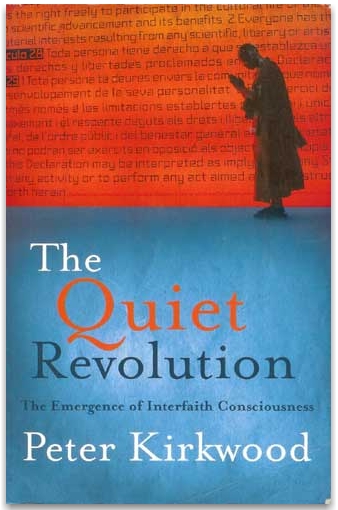
The Quiet Revolution
The emergence of Interfaith Consciousness
ABC Books (The Australian Broadcasting Corporation, Peter Kirkwood, 2007
ISBN 978 0 7333 2002 6
Available on Amazon
Born of a production called Tomorrow’s Islam for Compass, a weekly religion program broadcast in Australia, the program’s producer encountered the Interfaith movement for the first time. Peter Kirkwood was then to encounter the Cordoba Initiative, the American Society for Muslim Advancement, and the Affinity Intercultural Foundation of Sydney, Australia.
The author quickly uncovered a multitude of interfaith organisations world-wide (and growing daily) which led to a three part series and an accompanying book. This book is the narration of the encounters with individuals in the Interfaith movement as well as serving as an oversight and introduction to the movement as a whole.
The Interfaith movement was born in 1893 when four thousand people gathered at the World’s Fair in Chicago; that fair also hosted the Parliament of the World’s Religions. The hightlight of that Parliament was Swami Vivekananda, who showed his listeners how they could live a human life, filled with noble ideals and values, and pursue the common path towards divinity.
Swami Vivekananda became a pioneer of the Interfaith movement and remained in the United States for three years after the Parliament. In this modern era, the Dalai Lama captures the sentiments of the need for global harmony and peace, which forms the touchstone of the Interfaith movement:
Because we all share this small planet Earth, we have to learn to live in harmony and peace with each other and with nature. This is not just a dream, but a necessity. We are dependent on each other in so many ways that we can no longer live in isolated communities and ignore what is happening outside these communities and we must share the good fortune that we enjoy … As interdependents, therefore, we have no other choice than to develop what I call a sense of universal responsibility. Today, we are truly a global family. What happens in one part of the world may affect us all.
Many scholars were interviewed for this three part series; Raimundo Pannikar the Christian theologians with Hindu origins, the historian of religion, Karen Armstrong, Paul Knitter, Hans Kung and the founder of the Cordoba Initiative, Imam Feisal Abdul Rauf
The Interfaith movement is surveyed briefly and key issues raised by interfaith consciousness are examined. Does this lead to a sort of homogenisation, a sort of universal faith? The author examines this possibility. The basis for dialogue between the religions is the most important facet of inter-religious activity as it runs counter to fundamentalism. Can pluralism in religions and religious diversity provide any answers to fundamentalism?
Interfaith relations are not an optional extra, nor are they something new for this day and age. They are an imperative for world peace, for, as Hans Kung is wont to say, there will not be world peace until there is peace among the religions.
This is a most useful book for reading, reflection and action. While the material may be new territory for readers who have only known the faith and teachings of their own religion of birth, the art of crossing over and passing back is always an enriching one. One always returns to their own faith incredibly enriched with a greater sense that the Divine has many paths up the mountain for all his or her children.
![]()

